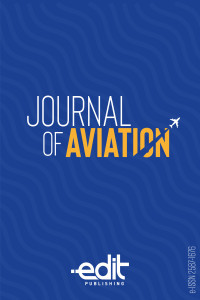Determination of Location Selection Criteria and Their Importance Levels for Air Cargo Companies: A Case from Turkiye
Anahtar Kelimeler:
Air Cargo Transportation, Location Selection, Cargo Hub
Determination of Location Selection Criteria and Their Importance Levels for Air Cargo Companies: A Case from Turkiye
Air cargo transportation attracts increasing attention among other alternative transportation models in developing countries due to its ability to provide the fastest transportation service to distant locations. A cargo hub, where air cargo companies perform their cargo operations, plays a critical role, especially in service time and cost. In choosing a site for their operations, understanding the importance of many seemingly independent factors/criteria such as airport system and infrastructure, proximity to production and consumption sources, and transportation connections play a critical role in balancing time and cost. Hence, the study aims to determine the location selection criteria of the cargo hub as the operation site of air cargo companies and to rank their importance. For this purpose, the opinions of experts in university and managers of big air cargo companies in Turkiye were collected. In the first stage of the study, the criteria were determined and categorized into four categories by using the Delphi method. In the second stage, the importance levels of the criteria were determined using the G-AHP method. The research findings highlighted “transportation diversity of the region”, “proximity to important production resources”, and “the structure of existing warehouses” as the most important criteria among others. The importance levels of location selection criteria categories ranked as “Supply, Equipment and Costs”, “Transportation Connections”, “Consumer” and “External Factors”. In summary, findings show that the most important factor affecting the location selection decision is related to the suitability of the airport's infrastructure for cargo operations.
Keywords:
Air Cargo Transportation, Location Selection Cargo Hub, Delphi, G-AHP,
___
- Al-Kwifi, O. S., Farha, A. K. A. and Zaraket, W. S. (2020). Competitive Dynamics Between Multinational Companies and Local Rivals in Emerging Markets. FIIB Business Review, 9(3), 189-204.
- Amankwah-Amoah, J. and Debrah, Y. A. (2011). The evolution of alliances in the global airline industry: A review of the African experience. Thunderbird International Business Review, 53(1), 37-50.
- Bates, T., Kahle, K. and Stulz, R. (2006). Why do U.S. firms hold so much more cash than they used to? NBER working paper series. Vol. w12534.
- Brigham, E. F. and Houston, J. F. (2009). Fundamentals of Financial Management, South-Western Cengage Learning.
- Campbell, J. L., Dhaliwal, D. S., Krull, L. K. and Schwab, C. M. (2018). US multinational corporations’ foreign cash holdings: An empirical estimate and its valuation consequences. SSRN 2277804.
- da Costa, M. B. and Nagano, M. S. (2014). Evolutionary models in cash management policies with multiple assets. Economic Modelling, 39, 1-7.
- Yayın Aralığı: Yılda 3 Sayı
- Başlangıç: 2017
- Yayıncı: Vedat Veli ÇAY
Sayıdaki Diğer Makaleler
Relationship Between Wingspan and Fuselage Length in Aircraft According to Engine Types
Çiğdem BOYACILAR ÇAĞLAR, Abdullah TÜRK
A Demographic Research on Compassion Fatigue and Job Satisfaction Levels of Aviation Employees
Why Are Flight Psychologists Important to Flight Safety?
Duygu TOPLU YAŞLIOĞLU, İbrahim Zeki AKYURT, Murat YAŞLIOĞLU, Teoman ERDAĞ
Bekir Alper YILDIRIM, Deniz ELBER BÖRÜ
A Profitability Analysis of Air Navigation Service Providers in European Zone: COVID-19 Crisis
